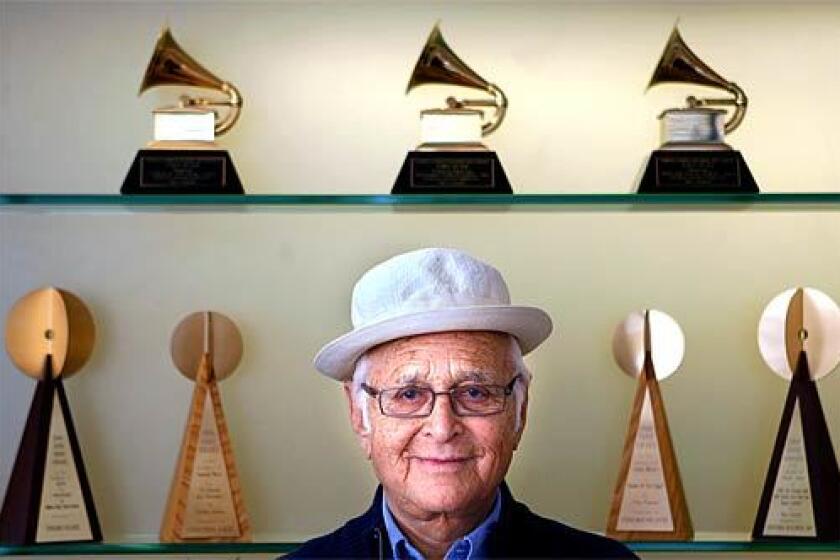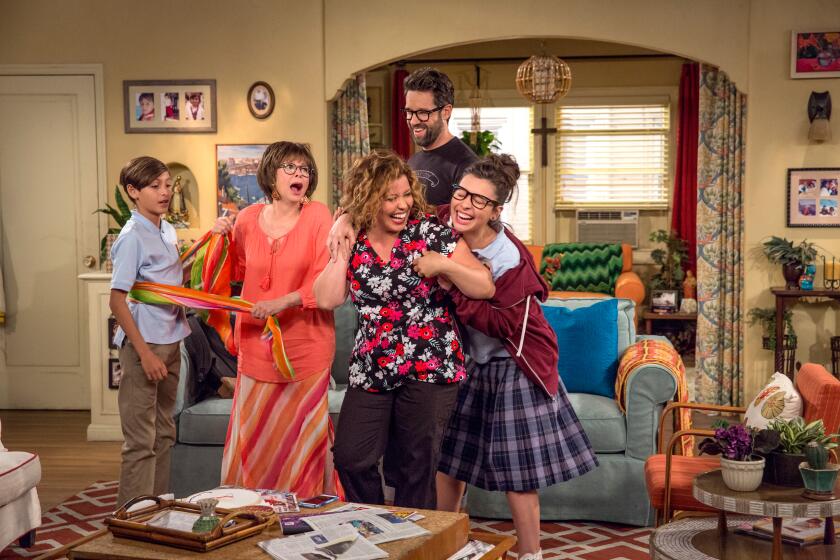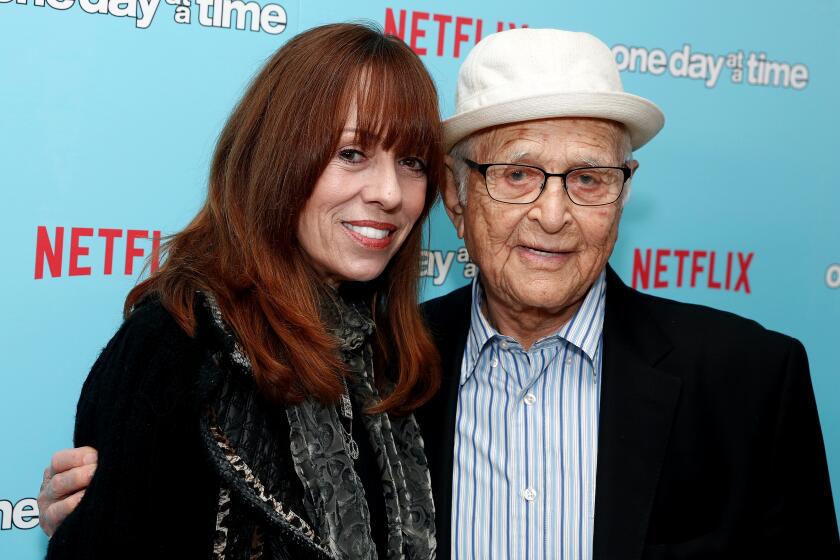Gloria Calderón Kellett: Norman Lear gave me the courage to embrace my purpose
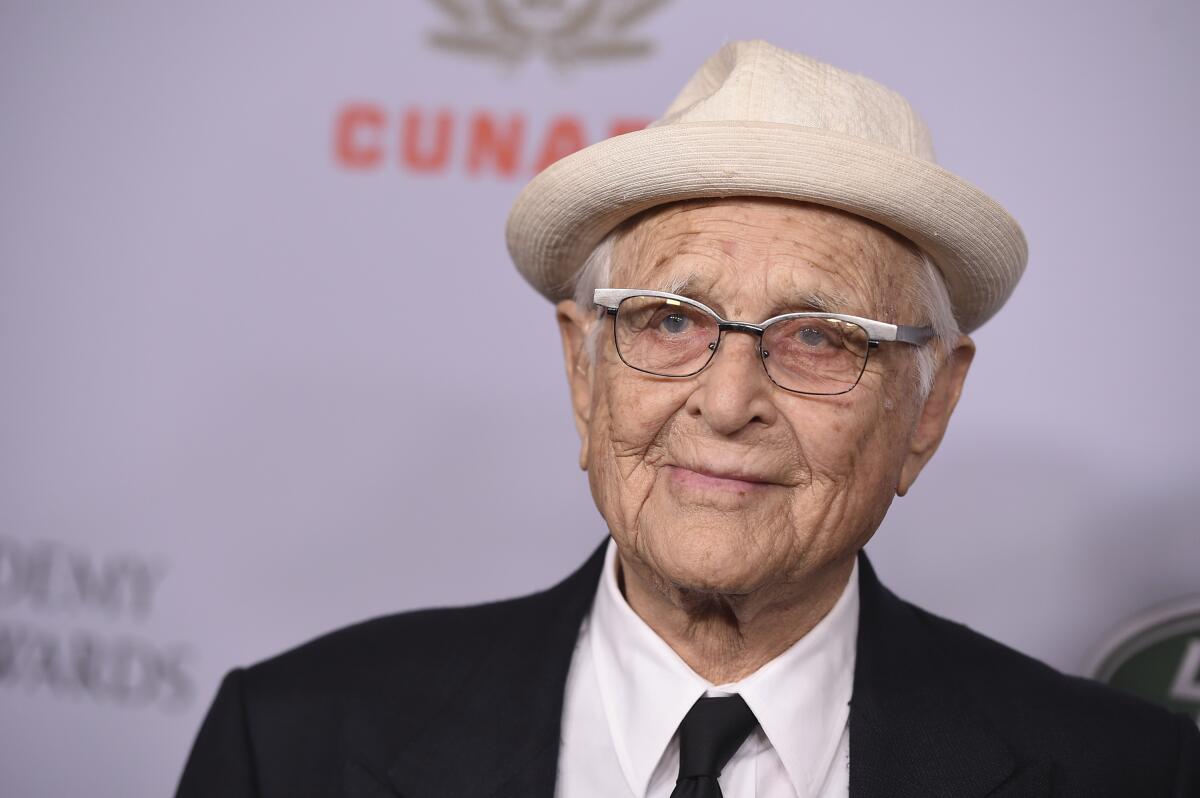
- Share via
Writer and producer Gloria Calderón Kellett worked closely with Norman Lear, developing the reboot of his groundbreaking 1975 show, “One Day at a Time.” Here, in her own words, she writes about her relationship with the TV icon.
On April 30, 2015, I had the privilege of meeting Norman Lear (then 95), an encounter forever etched in my memory. Sitting in the hallowed halls of Act III, his Beverly Hills office that is adorned with photographs of celebrities and world leaders, I felt the weight of history. As Norman walked in, however, he immediately treated me like an old friend, radiating warmth that instantly put me at ease. Feeling more comfortable in this meeting than in any meeting I had ever had — and this was Norman FREAKING Lear — I freely shared my story (like it was a therapy session) and that of my Cuban immigrant parents, who came to this country not knowing the language and learned English with the help of his television shows. Norman was touched. English as a second language for immigrant families was never how he thought of his shows, but here we were.
The multiple Emmy-Award-winning writer-producer and liberal political activist revolutionized prime-time television in the 1970s with groundbreaking, socially relevant situation comedies such as ‘All in the Family,’ ‘Maude’ and ‘The Jeffersons.’ He was 101.
As we delved into conversation, Norman broached the prospect of reimagining his 1975 show, “One Day at a Time.” Hesitant, I voiced the vulnerability of my community, recognizing the intense scrutiny any Latino show faced from within. The weight of healing a consistently erased community rested on my shoulders, as I keenly felt the collective eagerness for authentic representation, born from years of being let down by onscreen portrayals. Each attempt seemed to crumble under the weight of expectations within a continent-sized community that defied monolithic characterization.
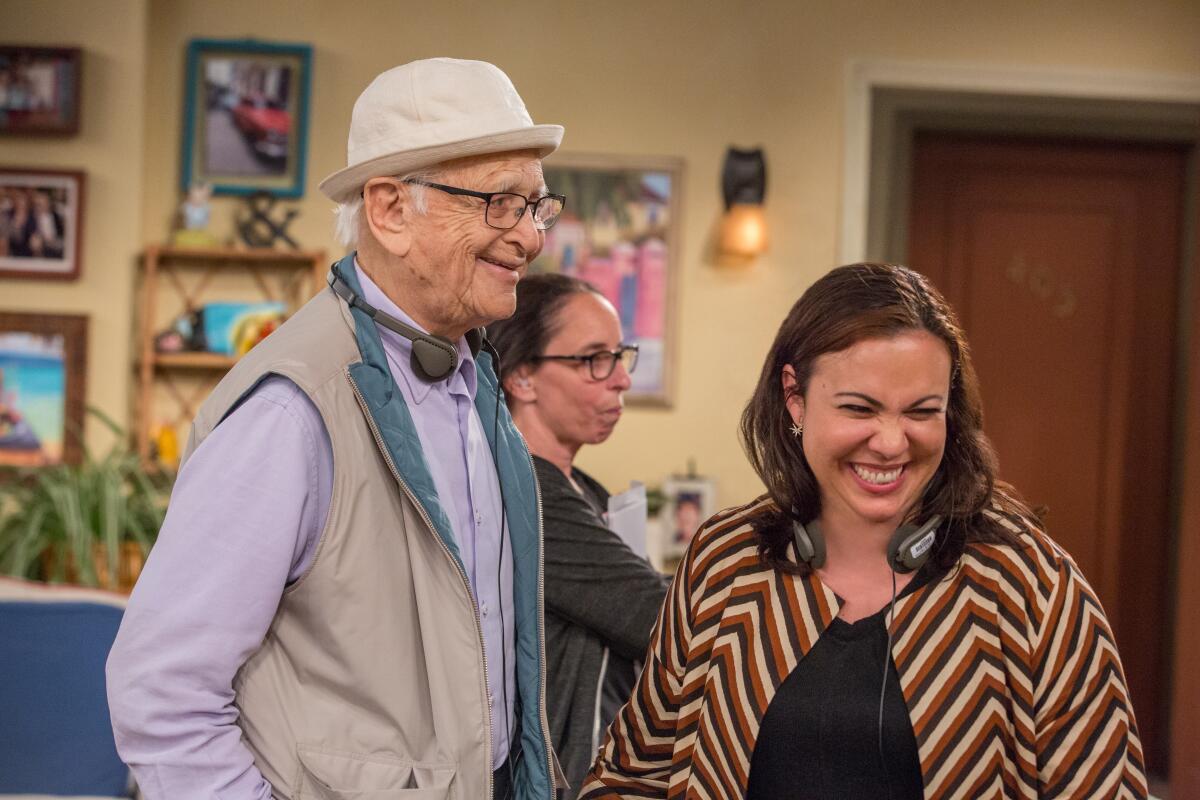
Norman acknowledged the challenge and with the curiosity of a child asked, “How could we fix that?” He was genuinely asking me. This genius, this titan was seeking my guidance. What?!?
I told him, honestly, that I could just speak for myself and my family. I could tell that story. I suggested we focus on the specificity of my family, conceding the impossibility of speaking for all Latinos. He nodded, reinforcing his commitment by stating, “Well, let’s do that then.” Like it was the simplest and most obvious thing in the world. “Let’s do that then.”
Norman Lear showcased actors and writers of color in his work, and the reboot of ‘One Day at a Time,’ which he executive produced, was no exception. It changed the way this writer engaged with TV, and his life.
He expressed curiosity about my mother, and I immediately drew a comparison I had been making my whole life … “Well, think Rita Moreno ...” I began, but before I could finish, Norman jumped in, “I know Rita. We should call her.” This moment reflected the generosity he had — willing to use his impressive Rolodex to help a girl he just met. When I mentioned Gloria Estefan as my dream choice for the theme song, he replied without hesitation, “I know Gloria, too. I’ll call her.” His unwavering support and willingness to leverage his connections empowered me. He was like a magical genie in a white hat.
1
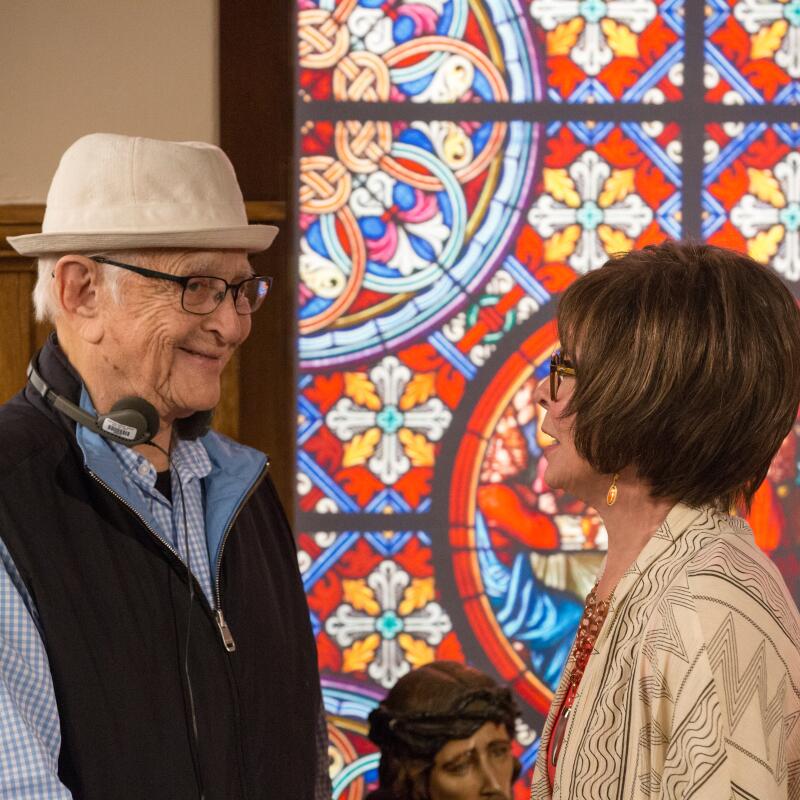
2
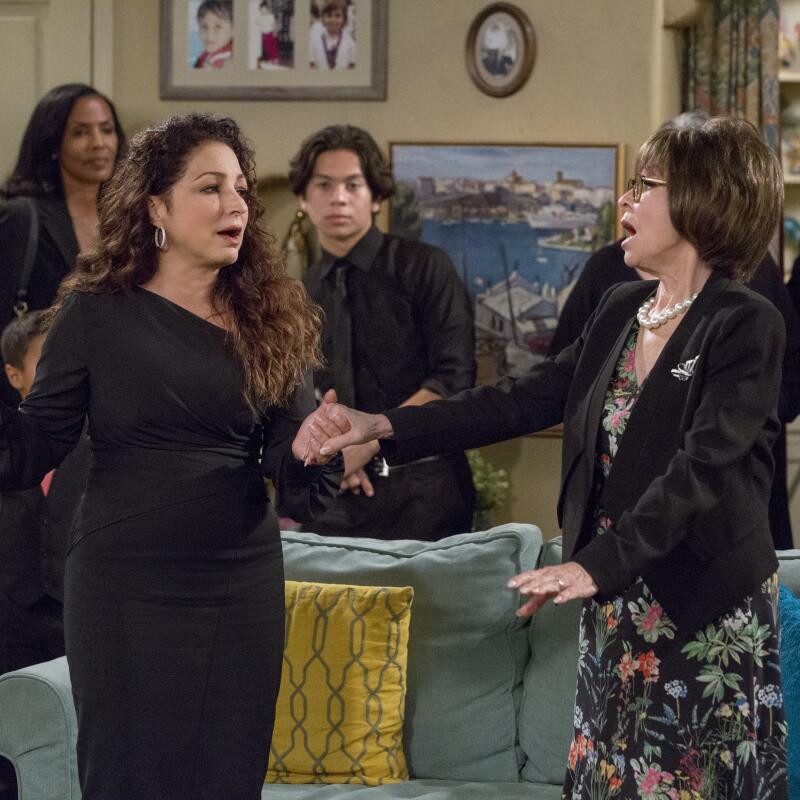
1. Norman Lear with Rita Moreno on the set of “One Day at a Time.” (Michael Yarish / Netflix) 2. Gloria Estefan, left, who sang the theme song for “One Day at a Time,” joins Rita Moreno on set. (Ali Goldstein / Netflix)
This marked the beginning of a transformative journey. Paired with accomplished, Emmy-winning showrunner Mike Royce, whom Norman believed would be a perfect fit, we formed a bond that transcended the professional. Norman and Mike became more than collaborators; they became my protectors, mentors and family. Over the next four years, through 46 episodes, and amid numerous awards and accolades, Norman Lear became a cherished presence in my life.
The last time I saw him was at a Hollywood Health and Society retreat, wheeled in by his trusty executive assistant, Cindy. As he stood to greet the room, his eyes met mine, and his face lit up with a familiar smile. “Gloria!” he exclaimed, and I rushed to embrace him. “How are you, Norman?” I inquired, to which he replied, “Better for having seen you.” A sentiment he had shared with many, but one that always rang true and sincere.
Our years together were nothing short of magical. Under the shelter of his love, I found the courage to fully embrace my purpose. Norman’s infectious laughter served as a validating beacon — if the man who essentially invented television found joy in my work, I must be on the right path. Norman Lear had an unparalleled love for stories, people and the universal human experience. His passion for building bridges through storytelling fueled him for an impressive 101 years.
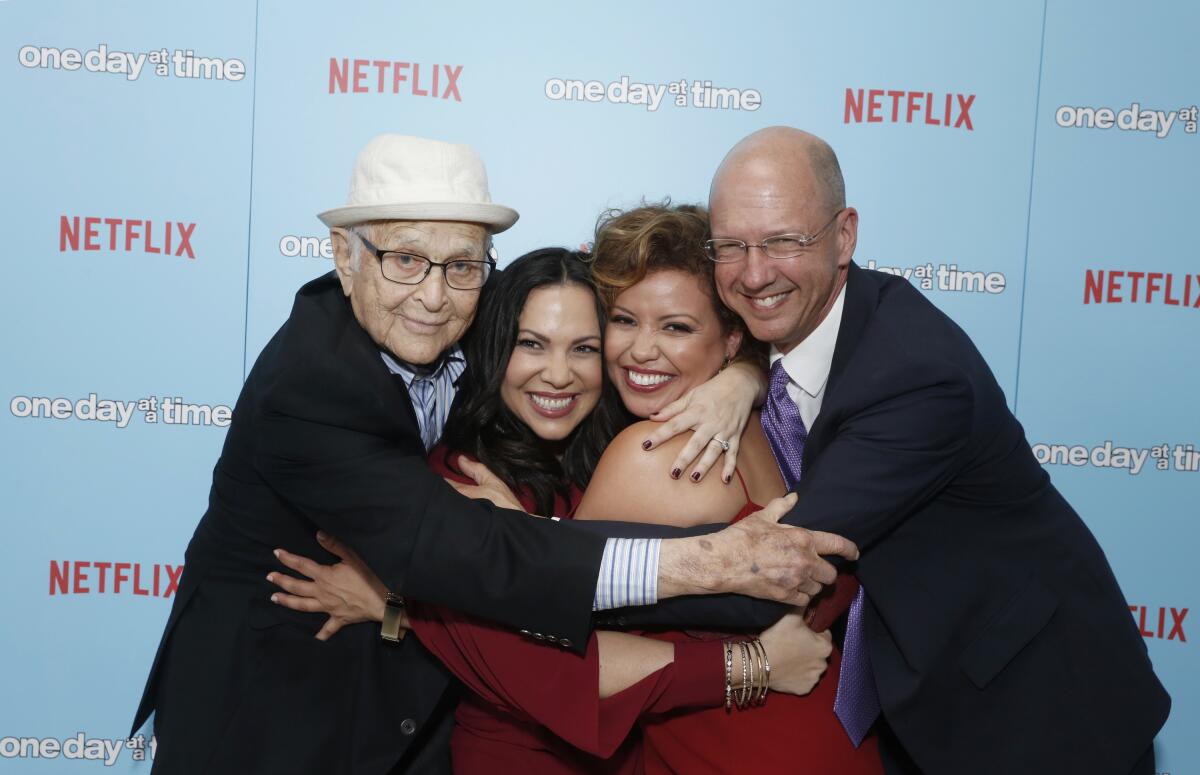
Norman was also a man of priorities, always answering calls from his children, regardless of the circumstance. I believe when we were pitching the show to Ted Sarandos at Netflix he received one such call. A loud ring broke the preamble banter we were having as we sat to pitch the show. This can happen, especially with older folks who forget to turn their ringers off. But to our surprise, he didn’t rush to shut down his phone. Instead, he calmly pulled the phone from his pocket, looked at who was calling and said, “Pardon me everyone, this is my daughter.” Then he answered the phone. I couldn’t believe it. He asked his daughter how she was doing and if she needed anything and when it was clear her call wasn’t urgent, he said, “I’m in the middle of a pitch, sweetheart, can I call you back?” And she must have said yes because he hung up. And guess what? Nothing bad happened. Everything was fine. They were better than fine. We were able to do the pitch and, in fact, sold the show.
Actor Mackenzie Phillips and director Rob Reiner spoke to The Times about working with the prolific TV producer Norman Lear, who helped nurture their careers at an early age and provided guidance and support as they got older.
It was a real lesson in priority. His family was always going to come first, no matter who he was talking to. I loved that because it meant mine could also come first and that I didn’t have to sacrifice home for work. His values were clear, and he lived with a purpose that surpassed any I had ever known. To say I loved him feels inadequate; those who caution against meeting your heroes clearly never met Norman Lear.
After shooting the pilot, with my Cuban exile parents in the VIP section, I was overcome with emotion. “Thank you for changing my life, Mr. Lear,” I expressed, expecting a modest acknowledgment. However, true to his character, he deflected the praise. “You would have gotten here, Gloria. I may have just saved you a little time.” Oh, how I wish for more moments like that, moments that mend the heart and elevate those fortunate enough to experience them.
Norman never said goodbye; instead, true to his TV roots, he would say, “to be continued...” Those were the last words he spoke to me. Preceding those were the simple yet profound words, “I love you.” Somehow, 101 years felt insufficient. I consider myself extraordinarily fortunate to have been a minuscule part of his world. Until our paths cross again, Norman, I am fueled to keep moving forward, with your stellar example as my north star.
Familia para siempre. “To be continued...”
More to Read
The complete guide to home viewing
Get Screen Gab for everything about the TV shows and streaming movies everyone’s talking about.
You may occasionally receive promotional content from the Los Angeles Times.
